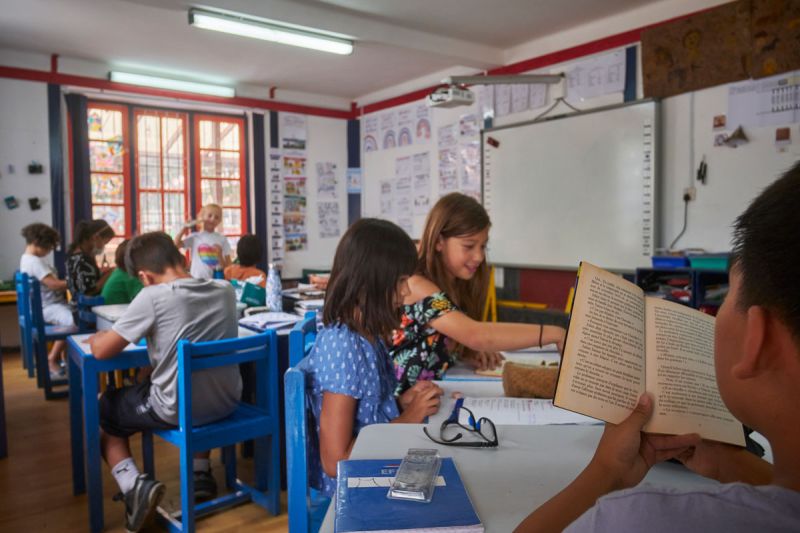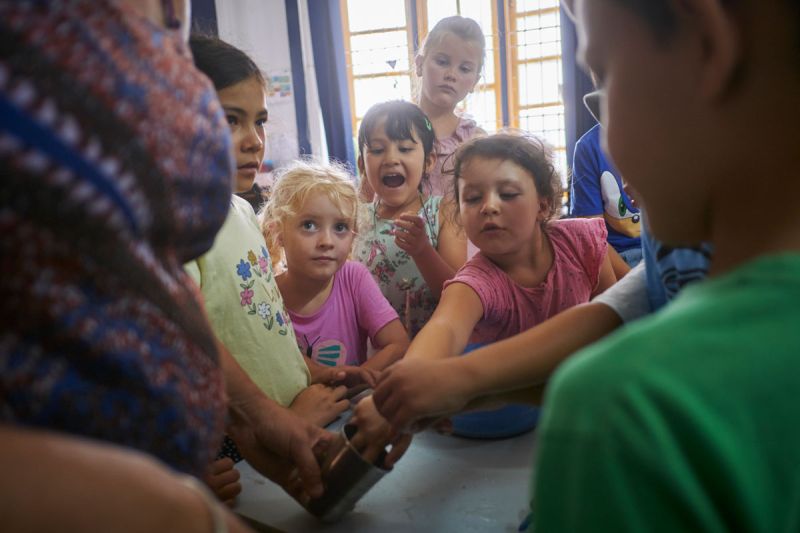ACADEMICS
Primary School at Efik – Kathmandu
CYCLE 2 – Primary school :
FUNDAMENTAL LEARNING CYCLE
Components and Skills of the Common Core at our primary school
-

Understanding and expressing oneself using the French language orally and in writing.
- Understanding and expressing oneself orally
- Reading and comprehending written text
- Writing
- Using the regularities that organize the French language correctly (within the limits of those that have been studied)
-

Understanding and expressing oneself using a foreign language.
- Understanding orally (and in writing)
- Using whole numbers
- Recognizing common solids and geometric shapes
- Orienting and moving
-

Understanding and expressing oneself using the languages of arts and the body.
- Expressing oneself through physical, sports, or artistic activities involving the body
- Practicing and understanding artistic languages
-

Organizing one’s personal work.
-

Cooperating with peers.
-

Researching and processing information using digital tools.
-

Expressing oneself (emotions, opinions, preferences) and respecting the expression of others.
-

Taking into account common rules.
-

Demonstrating belonging to a group.
-

Solving elementary problems.
-

Conducting some steps of a scientific approach.
-

Practicing simple behaviors that respect others, the environment, and one’s health.
-

Locating oneself in space and time.
-

Analyzing and understanding human organizations and representations of the world.
-

Imagining, developing, and producing.

| SUBJECTS | HOURS | |
| Annual Duration | Average Weekly Duration | |
| French | 360 hours | 10 hours |
| Mathematics | 180 hours | 10 hours |
| Modern Languages (foreign or regional) | 54 hours | 1 hour 30 |
| Physical Education | 108 hours | 3 hours |
| Artistic Education | 72 hours | 2 hours |
| Exploring the World and Moral and Civic Education (**) |
90 hours | 2 hours 30 |
| Total |
864 hours | 24 hours (*) |
|
(*) 10 weekly hours are dedicated to daily activities of speaking, reading, and writing that draw from all disciplinary fields. (**) Moral and Civic Education:36 annual hours, equivalent to 1 hour per week,with 30 minutes devoted to practical situations promoting oral expression. |
||
Primary school teaching at the service of the acquisition of the common base of knowledge, skills and culture.
CYCLE 3 – Primary School :
CONSOLIDATION CYCLE
CONSOLIDATION CYCLE
This cycle bridges the final two years of elementary school and the initial year of college, ensuring educational continuity and a consistent learning experience.
Having already acquired most fundamental skills and knowledge, students progress in all subject areas through the gradual and increasingly explicit development and deepening of their understanding.
PERFECT AND CONSOLIDATE THE CHILD’S INTELLECTUAL KNOWLEDGE AS WELL AS HIS APPETITE FOR FUTURE LEARNING.

-

Understanding and expressing oneself using the French language orally and in writing.
- Expressing oneself orally
- Understanding spoken statements
- Writing
- Utilizing the resources of the language
- Reflecting on the linguistic system
-

Understanding and expressing oneself using a foreign language and, if applicable, a regional language.
- Reading and comprehending written text
- Writing and reacting to written text
- Listening and comprehending
- Expressing oneself orally continuously and in interaction
-

Understanding and expressing oneself using mathematical, scientific, and computer languages.
- Using whole numbers, decimals, and simple fractions
- Recognizing common solids and geometric shapes
-

Understanding and expressing oneself using the languages of arts and the body.
- Expressing oneself through physical, sports, or artistic activities
- Practicing the arts by mobilizing various artistic languages and their expressive resources
- Reflecting on individual and collective artistic practice
-

Developing personal work tools and strategies for understanding and learning.
-

Collaborating and carrying out projects.
-

Researching and sorting information and getting acquainted with media languages.
-

Using digital tools for learning, exchanging, and communicating.
-

Mastering the expression of one’s sensitivity and opinions, respecting those of others.
-

Understanding rules and laws.
-

Exercising critical thinking, demonstrating reflection and discernment.
-

Engaging in a scientific or technological approach, solving simple problems.
-

Practicing simple behaviors that respect others, the environment, and one’s health.
-

Locating oneself in time and space.
-

Analyzing and understanding human organizations and world representations.
-

Reasoning, imagining, developing, and producing.
Cycle 3 (CM1/CM2)
| SUBJECTS | HOURS | |
| Annual Duration | Average Weekly Duration | |
| French | 288 hours | 8 hours |
| Mathematics | 180 hours | 5 hours |
| Modern Languages (foreign or regional) | 54 hours | 1 hour 30 |
| Physical Education | 108 hours | 3 hours |
| Science and Tchnology | 72 hours | 2 hours |
| Artistic Education | 72 hours | 2 hours |
| History and Geography Moral and Civic Education (**) |
90 hours | 2 hours 30 |
| Total |
864 hours | 24 hours (*) |
|
(*) 12 weekly are dedicated to daily activities of speakinng, reading, and writing that draw drom all disciplinary fields. (**) Moral and Civic education: 36 annual hours, equivalent to 1 hour per week, with 30 minnutes devoted to practical situations promoting oral expression. |
||
